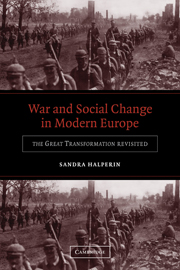Book contents
- Frontmatter
- Contents
- Tables
- Preface
- INTRODUCTION
- I SOCIAL FORCES, INDUSTRIAL EXPANSION, AND CONFLICT IN EUROPE'S NINETEENTH-CENTURY MARKET SYSTEM
- 2 The First Transformation: Social Forces in the Rise of Europe's Nineteenth-Century Market System
- 3 Europe's Nineteenth-Century Industrial Expansion: A “Bottom Up” Perspective
- 4 Europe's Century of War, 1815–1914
- 5 World War I and the Postwar Retrenchment
- II THE INTERREGNUM
- III THE GREAT TRANSFORMATION
- Appendix 1 Europe Defined
- Appendix 2 A Sample of Europe's Class, Ethnic, and Imperialist Conflicts, 1789–1945
- Appendix 3 European (Regional and Extraregional) Wars, Insurrections, Rebellions, Revolutions, Uprisings, Violent Strikes, Riots, and Demonstrations, 1789–1945
- Works cited
- Index
5 - World War I and the Postwar Retrenchment
Published online by Cambridge University Press: 06 July 2010
- Frontmatter
- Contents
- Tables
- Preface
- INTRODUCTION
- I SOCIAL FORCES, INDUSTRIAL EXPANSION, AND CONFLICT IN EUROPE'S NINETEENTH-CENTURY MARKET SYSTEM
- 2 The First Transformation: Social Forces in the Rise of Europe's Nineteenth-Century Market System
- 3 Europe's Nineteenth-Century Industrial Expansion: A “Bottom Up” Perspective
- 4 Europe's Century of War, 1815–1914
- 5 World War I and the Postwar Retrenchment
- II THE INTERREGNUM
- III THE GREAT TRANSFORMATION
- Appendix 1 Europe Defined
- Appendix 2 A Sample of Europe's Class, Ethnic, and Imperialist Conflicts, 1789–1945
- Appendix 3 European (Regional and Extraregional) Wars, Insurrections, Rebellions, Revolutions, Uprisings, Violent Strikes, Riots, and Demonstrations, 1789–1945
- Works cited
- Index
Summary
Starting with the Great Depression and the agrarian distress of 1873–86, tensions increased within many European countries. At the same time, a second great wave of European imperialism began that increasingly focused European imperialist ambitions, once again, on Europe itself.
The resurgence of imperialist rivalries in Europe had profoundly dangerous implications. It had the potential to trigger a multilateral Great Power conflict in Europe that not only would bring massive dislocations and destruction, but, by threatening the territory and national survival of the belligerents, it would compel governments and ruling elites to mobilize the masses for war.
Mass mobilization during the Napoleonic era had strengthened radical forces throughout Europe, sustaining the “Great Fear” of 1789 throughout the French Revolutionary and Napoleonic wars and for decades beyond. This was not simply one among many events recorded in the collective memory of Europe's owning classes: it had shaped the socioeconomic and political institutions of European societies throughout the nineteenth century. The growth of union organization and socialist radicalism in the final decades of the century gave European elites even more immediate grounds to fear the consequences of mass mobilization.
But by the beginning of the twentieth century, with fewer possibilities for overseas expansion, and Europe itself becoming, once again, an arena of imperialist rivalry, ruling elites were confronted with the possibility of a major European war and, consequently, the necessity, once again, to mobilize the masses. This was precisely what a century of overseas imperialist expansion had been designed to prevent.
- Type
- Chapter
- Information
- War and Social Change in Modern EuropeThe Great Transformation Revisited, pp. 145 - 172Publisher: Cambridge University PressPrint publication year: 2003



